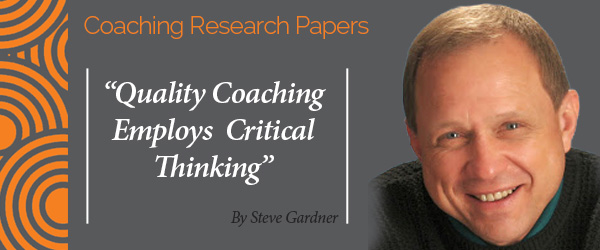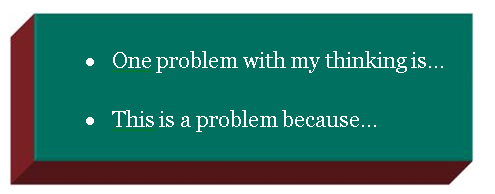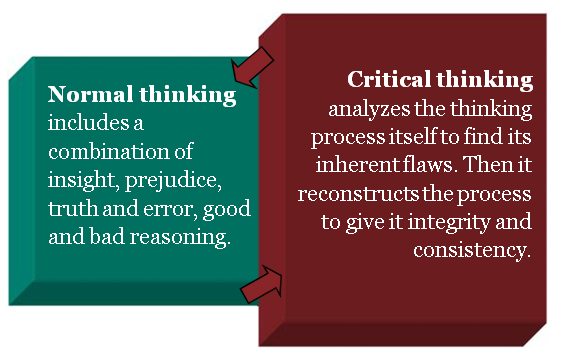A Research Paper created by Steve Gardner
(Executive Coaching, UNITED STATES)
Coaching is the art of helping clients close the gap between their present reality and their desired reality. Closing this gap requires involving all three of the mind’s basic functions: thinking, feeling, and wanting.
Understanding how these functions work and interrelate is crucial to coaching that helps people get unstuck and make progress in areas that are (and will remain) meaningful to them.
Coaches naturally desire to help clients increase their ability to
Clients understand that thinking has consequences, but many do not realize the extent of the consequences related to the way they think. Although coaching is not consulting or instructing, it does facilitate the decision-making process. Awareness of critical thinking supports a higher quality process that results in higher quality decisions.
Because the client is responsible for the content of coaching and the coach is responsible for the process, this paper focuses on critical thinking as one important foundation for the coaching process.
Critical thinking is not negative or closed thinking; it is disciplined thinking. Paul and Elder define critical thinking as “the art of analyzing and evaluating thinking with a view to improving it.”1 Fisher and Scriven define critical thinking as “Skilled, active, interpretation and evaluation of observations, communications, information, and argumentation.”2
Critical thinking begins by being critical of your own thinking. Start where you are now. Consider your normal thinking process and complete the statements in this box.
If you are skilled in the art of critical thinking, you may self-identify multiple problems and fill pages with answers. If you are not, you may have difficulty finishing the first sentence. What does this reveal about the current state of your normal thinking process?
Imagine a child who was born with a serious vision problem. Her condition would be her norm, and she would have no knowledge of any deficiency without some means of comparison with others. Innocent ignorance would consign her to a lifetime of unnecessary challenge; competent testing would reveal the deficiency and enable corrective glasses to resolve it.
Realizing that the way you think is as natural to you as the way you see or hear, consider these questions with regard to your thinking.
- How much of your thinking is vague, inconsistent, illogical or superficial?
- Are you in control of your thinking process?
- Do you have any standards for testing it?
- What could you teach about how to think?
Critical thinking is “self-directed, self- disciplined, self-monitored, and self- correcting.”3 It is not a tool you add to a repertoire of problem-solving skills; it is a second layer you add onto your thinking—a diagnostic layer that analyzes the thinking process itself.
No matter how well you currently think, you can learn to think better. This requires being intellectually humble, which is aided by recalling opinions you once held strongly but have since disproven.
If you recognize that you have subconscious biases, blind spots, and a tendency to be over- influenced by what those around you say, you are in a better position to engage in these basic elements of critical thinking:
In summary, critical thinkers routinely practice two broad thinking processes:
- Identify and challenge the assumptions underlying beliefs and behavior.
- Explore and imagine alternatives to current ways of thinking and living.4
Since your thinking is crucial to everything you do, want, or feel, it is worth engaging in the intellectual work required to improve it.
1 Paul, Dr. Richard; Elder, Dr. Linda. (2007) The Miniature Guide to Critical Thinking Concepts and Tools. Dillon
Beach: Foundation for Critical Thinking Press, p. 4
2 Fisher, Alec and Scriven, Michael. (1997) Critical Thinking: Its Definition and Assessment, Center for Research in
Critical Thinking (UK)/Edgepress (US). p. 20
3 Paul and Elder. The Miniature Guide to Critical Thinking Concepts and Tools, p. 4
4 Brookfield, Stephen D. (1987) Developing Critical Thinkers. San Francisco: Jossey-Bass.


